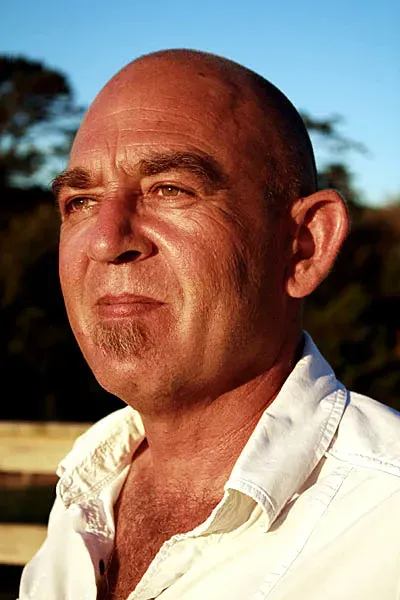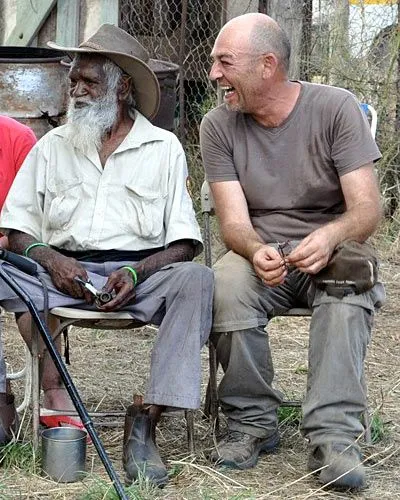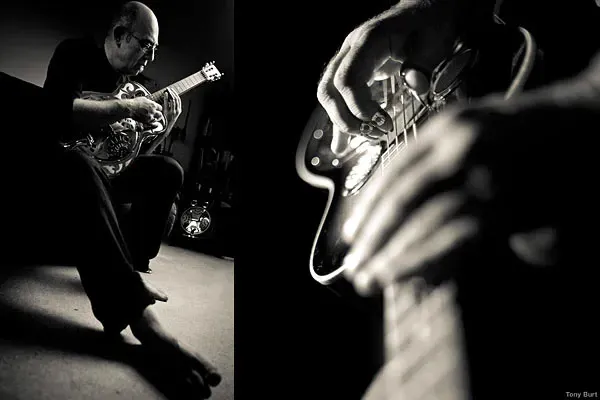Live on Film
Written by

Filmmaker and composer Tony Burt has blended his skills and talents into an innovative documentary with live narrations and music performance that take the audience through his autobiographical story.
In this QnA Tony tells us more about his journey to create The Snapper Sandwich and challenge the boundaries of film presentation.
"This is a different type of presentation and it is an experimental form of documentary but I did not want to use the experimental label as an excuse to detract from the strength of narrative but rather to create an experience that is enhanced with the filmmaker as the journeyman and story teller."
See The Snapper Sandwich and live performance on April 19 at Documentary Edge Festival in Auckland.
During what hours of the day do you feel most inspired?
Mostly I work best in the evening and the real creative hours and well past midnight. The morning and first coffee I think of as the review period to look at the creative output in the light of day.
How would a good friend describe your aesthetic or style?
Tapping into the emotional underscore, the heart of a story and reflecting it back.
What aspect of your creative practice gives you the biggest thrill?
The biggest thrill is reviewing the results of putting all the parts together. If it makes me feel something, as they say tears for the writer tears for the reader, laughter or any strong emotion then if I like it then that’s the best I can look for. Hopefully others will too.
How does your environment affect your work?
Environment is big factor as is good working space. I have my edit and sound suite set up with all my instruments handy so I can move from editing to writing and recording music and sound design in one space. The creative space machine. This seems to spill out in to the whole house. Best creative tool at the moment is using the fridge as a whiteboard... rather than searching for that notebook before losing a flash of inspirational, I never have to think, now where did I put the fridge?
Do you like to look at the big picture or focus on the details?
I tend to flip between the big picture and the detail, this is really the nature of filmmaking and music, I look at the big picture and the feeling and messages I am conveying. Achieving the objective requires the detail and here is a lot of detail to keep track of.
What's your number one business tip for surviving (and thriving) in the creative industries?
I wish had that one worked out but it is an ongoing process, integrity and honesty works well to establish relationships in a business that works so much on collaboration. The other is to find your strengths, develop a niche and a point of difference.
Which of your projects to date has given you the most satisfaction?
I would say that The Snapper Sandwich has given me the most satisfaction for the single reason that it is a culmination of work and music that in itself has been satisfying. When I sat down to consider writing a live performance for my music, finishing a documentary about Urenui Motor Camp, consolidating my work in Australia in the Aboriginal communities and potentially writing a book about my experiences there, The Snapper Sandwich is a consolidation of all these into a single performance and film.
Who or what has inspired you recently?
Searching for Sugarman inspired me, as much for the art of documentary making as for the story itself. Building a strong narrative and director Malik Bendjelloul having the fortitude and tenacity to complete the film, edit it himself, look at ways of creating graphics as with the pencil drawings and 8mm film effects to overall create such a compelling story. I recently bought the DVD and watched it 3 times in close succession with different friends who came round for movie nights, it got me every time, that’s filmmaking deservedly worthy of the recognition in my opinion.
Tell us a bit about your background
In the creative arts industry I started out as musician and playing in bands in the late 70’s and have never stopped playing or writing music since. It was through music that I first got into film in the late 1990s writing the soundtrack to short film Splinter. As I found it easier to write the music as an homogeneous part of the sound track ended up doing a complete sound replacement for the film, so that kicked off my sound design phase.
I thought I would give filmmaking a go and bought a Canon XM2. My first real outing with the camera was filming the Hikoi in Wellington in 2004 and putting the images to music I had written. I wanted to express the intense feeling and emotion that I felt while filming the march and the result was a 5 minute piece called Te Aurere me te Papaa. After several film festivals and awards this was selected for the 2005 National Geographic All Roads Film Festival and screened at the Egyptian theatre in Hollywood and National Geographic in Washington DC. So from late nights on a PC in the dining room editing on adobe premiere to a Hollywood screening was somewhat surreal.
It was from this that I found the real heart was not the glamour of the film industry but the insight to people of indigenous cultures and meeting people from different cultures that was the real inspiration and that media does matter and can make a difference.
Over the years I have worked in various capacities, musician, composer, filmmaker, sound design, filming the fairy stories of the Ureweras with Anituatua Black in Tuhoe dialect and collaborating with Whiremako Black composing the soundtrack for the Te Papa exhibition E Tu Ake. I also composed and recorded the soundtrack for many short films and several documentaries and a feature film When Night Falls and recently co- composed with Maaka McGregor the music for Whenua, an exhibit at Te Papa on Maori land loss over the 20th century and Wiremu Grace’s documentary Ka Mate The Haka The Legend.
During this I was also working as Project Manager contracting in the corporate world running large IT projects as it was good means of income. It was through this that I became aware of work being undertaken in Australia where a group of major corporates had joined forces with indigenous leaders in far North Queensland to drive an agenda of social change for Aboriginal communities in the region. After suggesting that a documentary covering the work would be have its benefits and on the condition that I have full creative licence to not make a corporate production I had found a way to pursue immersive documentary filmmaking outside the traditional funding models.
The resulting film Indigenous Enterprise Partnerships screened in Australia and is still used to convey the work and the people though personal stories of inspiration.
Through the ongoing involvement I was asked to program manage the Cape York Program for one of the corporate partners and so worked across social, education and business development projects providing people and resources while at the same time continuing with film projects that really mattered, it was the immersion to really understand some of what’s really important and formulated strong opinions on indigenous and modern society along with corporate social responsibility and what drives change.
Recently I picked up playing the resonator lap guitar which is not a very common instrument in New Zealand and have incorporated this into my live performance and record along with fingerstyle guitar. I have found that I cannot easily separate the music from the films as it is mostly inspired by the people places and events.
Tell us a bit about your documentary
The Snapper Sandwich is the story of a filmmaker and musician setting out on a journey and though a series of stories explores media that matters, what makes a difference and finding your place to stand which is not always where you expect. There are wonderful inspirational characters and events along the way, poignant, funny and at times immensely powerful.
The Snapper Sandwich is a project in itself and the inspiration for it came about during a somewhat stressful time. In 2010 I was diagnosed with prostate cancer and found it was time to focus on my own challenges and wellbeing in preparing for the treatment and recovery.
Knowing I had at least eight weeks of recovery I wanted to make the best use of this time while laid up, possibly writing a book on my ventures in far North Queensland, writing music and developing a live concert performance, finishing a wonderful film on the Urenui Motor Camp which is a very personal family story, whichever way I did not want to sit around feeling sorry for myself.
The eureka moment came when selecting the music for a live performance and decided to spice it up with images and stories that inspired the music. I found a rich narrative that tied together all these seemingly disparate stories together and as the story teller and musician on stage could express this in a way that had not really been done before in a traditional documentary style. The Snapper Sandwich was conceived and grew into a feature documentary and live music and narration performance. So that was how I spent my recuperation time, writing, editing and producing this show.
This is a different type of presentation and it is an experimental form of documentary but I did not want to use the experimental label as an excuse to detract from the strength of narrative but rather to create an experience that is enhanced with the filmmaker as the journeyman and story teller.
The film was selected as one of the projects to be work-shopped at the Documentary Edge DOC Lab 2013 This was a valuable exercise to discuss the project with some great mentors and colleagues and in some ways challenge the boundaries of film presentation.
Submitting it to film festivals was a challenge in itself because the screen is only half the overall presentation. I also needed to better understand how an audience would experience the overall concept, does it seamlessly flow and move attention between the live aspect and the film?
To address this I arranged a test screening locally in Petone with Andrew Biknell from the Wellington Bluegrass Society so I could try out the performance and film it. The feedback was fantastic, it showed that the concept worked and personally I felt that live narration is so much more expressive and in the moment, something you can’t really recreate with a voice over. The same went for the music, feeding off the audience and the film to express the emotional underscore in the moment. It also gave me the much needed festival DVD.
As for The Snapper Sandwich itself, the meaning behind it becomes evident in the film.
Why is documentary important?
I have found that real life is so much more captivating that fiction and has the means to effect and influence change. Through inspiration, provocation and expressing stories and points of view, documentaries influence the viewer to formulate their personal and collective opinions. That said, it is the job of the documentary filmmaker to remain true to the subjects in the film and not mis-represent them. Finding the heart of a story documentary can reflect back what we miss in our daily lives and also challenges the viewer to assess their own values and opinions. In this way it is media that matters and in that sense alone is a powerful medium for enriching our understanding of the world around us.
For this reason alone, the story tellers and the art of documentary deserves funding and support.
What do you think of the new documentary funding?
The new documentary funding model is great news for an industry that really has not had the same level of financial support compared to dramatic productions.
It is good to also see there is a step up model to support first time directors and start up projects. Ideally there needs to be funding options that will cater for and support film makers be they experienced or first time directors. I hope that the gap between experienced filmmakers without a feature film and first time directors is catered for and funding options are available to cater for all experience levels.
I look forward to an increased number of quality documentaries produced as a result.
What else is needed to support documentaries in NZ?
An audience. For this we need films people will want to watch
Tell us about your other upcoming projects.
Right at the moment I am focusing on The Snapper Sandwich and where it will go as a new concept in performance and documentary. I want to also explore what this means from the perspective of deriving a sustainable income as a practitioner and artist. Traditionally once a film is finished, revenue can come in the form of licence fees and /or distribution deals. This could open up a whole new way of looking at the model. When you include live performance fees, performance music royalties, music sales, online supporting content, social media and bringing the artist and filmmaker to the audience it has the potential to break some of the traditional boundaries, its all new ground.
I am also working on a cracker documentary Heart of Bluegrass filmed in the USA and New Zealand featuring fantastic artists and music legends such as Jessie McReynolds, Ron Block from Alison Krauss and Union Station and New Zealand’s very own Hamilton County Bluegrass band. Amazing music and characters and as one bluegrass fan in Nashville told be “bluegrass is thrash metal for hillbillies”
I also have several ideas in the concept phase, given the in depth research and recent experience with prostate cancer, I do believe a candid no holds barred tell it like it is documentary on prostate cancer would be a very worthy subject. Its working title is Walnut. While there is a lot of information out there, the detailed questions, conversations and worrying symptoms I get told about by concerned blokes at some events and concerts I have performed, has lead me to the opinion that this would indeed be media that matters.
If you could go back and choose a completely different career path to the one you've chosen, what would it be?
I had a career in project management in the corporate world, right now music and film is the different career path and I intend to make a really good go at it. If I was to choose something different it would be in the area of indigenous social and economic development and traditional knowledge revival.
Failing that, the marketing and distribution of “Tonys Yorkshire Pudding Pies”. The taste of mums home made roast beef dinner in a Yorkshire pudding. My own invention and they are really really good.
What place is always with you, wherever you go?
Home and family
What's the best way to listen to music, and why?
Live music has an energy that you don’t get with a recording , being in the moment with the artists who have put thousands of hours of practice to hone their skill and craft.
You are given a piece of string, a stick and some fabric. What do you make?
At least 100 different sound effects.
What's the best stress relief advice you've ever been given?
Go with the flow.
Though I did see a great piece of advice on a bottle of Janola “keep cool and upright”
What’s great about the Documentary Edge Festival and Forum?
Firstly the festival showcases great documentaries, I am looking forward to many hours of quality viewing, watching real world stories and discovering new places and people through the eyes of talented filmmakers. The Edge forum will also be great to share ideas build relationships and learn from experienced mentors, I’m looking forward to soaking it all it.
I applaud the Documentary New Zealand Trust, Dan Shannan and Alex Lee for the dedication to the industry and as a voice and supporter for documentary film making. Not only do they showcase fantastic documentaries but they also stand as a voice for the industry which has in no small way lead to the current developments in film funding. Innovations such as this year's DOC Lab focused on transmedia and brought mentors and filmmakers together to explore new ways to approach documentary in a changing media landscape. Personally I gained a lot from this with The Snapper Sandwich. In no small way, the feedback gained from DOC Lab mentors and colleagues helped towards the completed project.
What’s your big idea for 2013?
Do something that makes a difference.
* * *
- The Big Idea is proud to be a Media Partner for Documentary Edge Festival 2013.

This work is licensed under a Creative Commons Attribution-NonCommercial-NoDerivs 3.0 New Zealand License.


